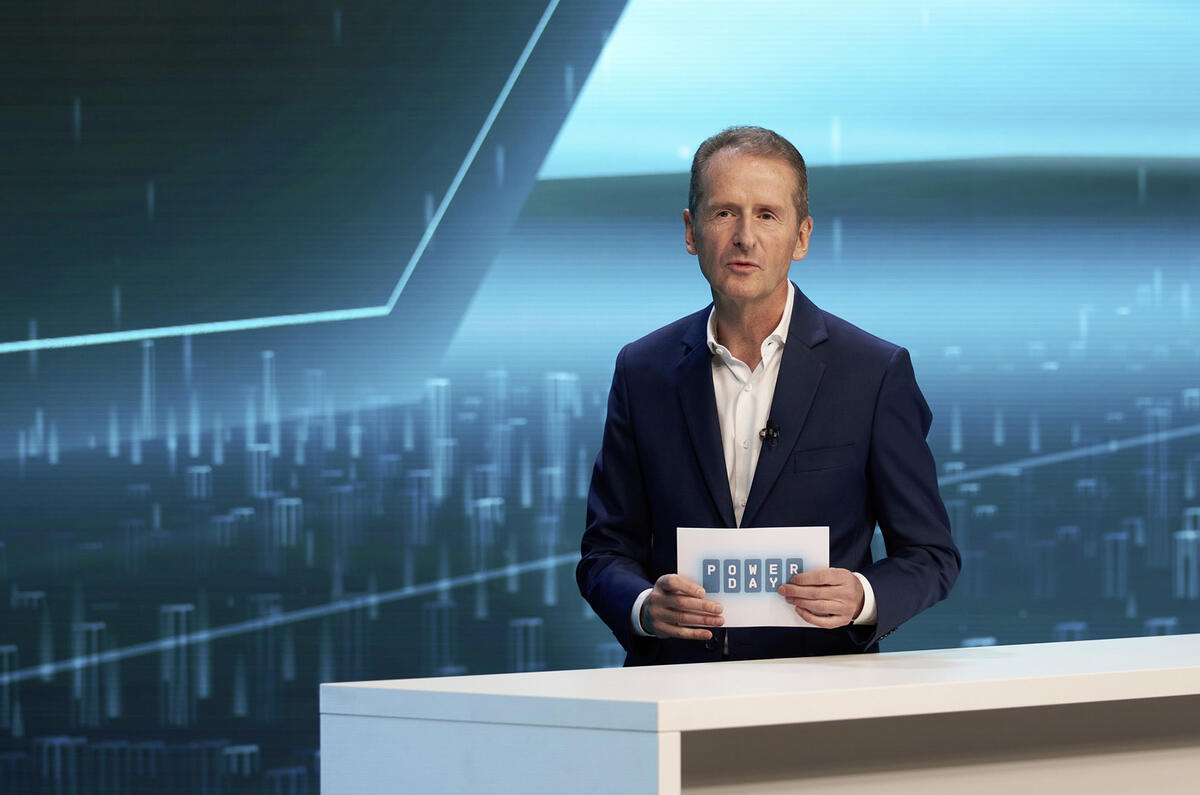The Volkswagen Group is aiming to switch 80% of its EV line-up to a single battery cell format by 2030, a move that it says will radically reduce the cost of electric cars.
VW has also committed to a massive expansion of electric car battery production, with plans to open six gigafactories in Europe by the end of the decade.
The plans were unveiled at the VW Group’s first Power Day event, and are part of moves by the group to gain an edge in electric vehicles through battery technology.
VW Group boss Herbert Diess said: “E-mobility has won the race. It is the only solution to reduce emissions fast. It is the key pillar of Volkswagen’s future strategy, and our goal is to secure pole position in the global scaling of batteries.
“Power will become a new core competence from Volkswagen and an integral part of our new strategy.”
VW Group Unified Battery Cell to launch in 2023
The VW Group will start to introduce a new ‘Unified Cell Concept’ into models from 2023 onwards, with the cell used in 80% of its global EV line-up by 2030. The technology will make its first appearance on the first VW Group model to use the new Artemis platform being developed by Audi.
Thomas Schmall, the VW Group’s technology boss, said: “We aim to reduce the cost and complexity of the battery and at the same time increase its range and performance. This will finally make e-mobility affordable and the dominant drive technology.”
Schmall said that optimising the cell type, “innovative” production methods and recycling would reduce battery costs in entry-level models by 50%, and in ‘volume segment’ models by 30%. He added: “We will drive down the cost of battery systems to significantly below €100 per kilowatt hour.”
Six battery gigafactories planned
The VW Group is also working on plans for future battery technology, with a heavy focus on making solid state batteries – which are lighter and faster to charge – production-ready.
The firm is aiming to take much of its battery production in-house, with plans to construct six gigafactories across Europe by 2030. Each factory will have production capacity for 40GWh, giving the group a total European battery production capacity of 240GWh.
The first two factories will be located in Skellefteå, Sweden, and Salzgitter, Germany. The Skellefteå site will focus on ‘premium cell’ production, while Salzgitter will produce the new unified battery from 2025 onwards.
One of the remaining sites will be located in southern Europe, likely Spain, with the other in eastern Europe. VW has yet to finalise the location for the remaining two.
More investment in charging infrastructure
Diess said that VW is planning a major investment in developing a charging network, saying that: “Our aim is to create the world’s largest high-power public charging network.”
VW is working with a number of partners to offer around 18,000 public fast-charging points in Europe by 2025, which it says would mark a fivefold increase on the current network and would be enough to meet around a third of the continent’s total EV demand by that date.
That investment will be led through its Ionity joint venture. That firm has reached an agreement with BP to establish around 8000 150kW fast-charging points in Europe, the majority in the UK and Germany.
The firm is also planning 3500 new fast-charging points in the US by the end of this year, and is working with joint ventures in China to install 17,000 fast-charging points in that market by 2025.
READ MORE
New Volkswagen Trinity project is radical EV flagship for 2026








Join the debate
Add your comment
They seem to have left out Global Britain.
Volkswagen will take over as the worlds number one electric car brand. Tesla will be thrashed by VW, & they will have to move even more upmarket to stay afloat, because they wont be able to compete at the lower price range with them.
We'll sell 'em to ya, but we wont build 'em there. We live off your sales but wont invest in your people. Basically you are crap at making cars but we love it when you buy millions from our EU factories. In the future all cars will be made in Germany. You lost.